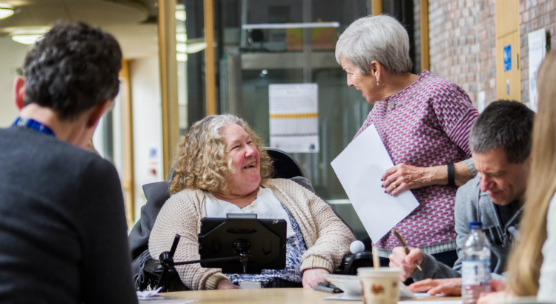£1 million project aims to help people with complex disabilities enjoy conversation
Published On Fri 2 Sep 2016 by Grant Hill

A £1 million research project that aims to dramatically change the way people with no speech and complex disabilities can converse with others has been launched by the Universities of Dundee and Cambridge.
Computer-based systems – called Voice Output Communication Aids (VOCAs) – use word prediction to speed up typing, a feature similar to that commonly found on mobile phones or tablets for texting and emailing.
However, for those with complex disabilities, like Professor Stephen Hawking, using typing to communicate can still be extremely slow. With as little as two words per minute generated, face-to-face conversation can be very difficult. Even with an average computer-aided communication rate of about 15 words per minute, conversations do not compare to the speaking rate ten times faster of people without a communication impairment.
It is estimated that more than a quarter of a million people in the UK alone are at risk of isolation because they are unable to speak and are in need of some form of augmentative or alternative communication (AAC) to support them with a severe communication difficulty.
“Despite four decades of VOCA development, users seldom go beyond basic needs-based utterances as communication rates remain, at best, ten times slower than natural speech,” explained Rolf Black, one of the project investigators at the University of Dundee. “This makes conversation almost impossible and is immensely frustrating for both the user and the listener. We want to improve that situation considerably by developing new systems which go far beyond word prediction.”
The team want to produce the first VOCA system which will not only predict words and phrases but will provide access to extended conversation by predicting narrative text elements tailored to an ongoing conversation.
Dundee’s Professor Annalu Waller, who is lead investigator for this research project, explained, “In current systems users sometimes pre-store monologue 'talks', but sharing personal experiences and stories interactively using VOCAs is rare. Being able to relate experience enables us to engage with others and allows us to participate in society. In fact, the bulk of our interaction with others is through the medium of conversational narrative, i.e. sharing personal stories.”
By harnessing recent progress in machine learning and computer vision, they plan to build a VOCA that gives its non-speaking user quick access to speech tailored to the current conversation. In order to predict what a person might want to say, this VOCA will learn from information it gathers automatically about conversational partners, previous conversations and events, and the locations in which these take place.
Dr Per Ola Kristensson from the University of Cambridge, one of the inventors of highly successful gesture keyboard text input system for mobile phones, brings his extensive expertise in probabilistic text entry to the project. He said, “What I find truly exciting about this project is the way it will advance state-of-the-art techniques from statistical language processing to potentially drastically improve text entry rates for rate-limited users with motor disabilities.”
Rolf Black added, “This does not mean that the computer will speak for a person. It will be more like a companion who, being familiar with aspects of your life and experiences, has some idea of what you might choose to say in a certain situation."
The project is named ‘Augmenting Communication using Environmental Data to drive Language Prediction – ACE-LP’ and brings together research expertise in Augmentative and Alternative Communication (AAC) and Computer Vision & Image Processing at the University of Dundee with Intelligent Interactive Systems at the University of Cambridge.
ACE-LP has a number of partners including Capability Scotland and Scope, the two leading charities for people with complex disabilities in the UK, and the ENT at Ninewells Hospital, NHS Tayside.
Industry partners include two of the world leading developers of VOCAs, Smartbox Assistive Technology and TobiiDynavox, as well as Arria NLG Ltd, the market leader in real-time data storytelling, and Edesix Ltd, a leading provider of advanced Body Worn Camera Solutions, based in Edinburgh.
The universities will also work with National Museums Scotland and the leading UK charity Communication Matters to ensure that the results of the research are communicated beyond the science communities into clinical work and mainstream knowledge.
This research project is funded by the UK Engineering and Physical Sciences Research Council (EPSRC).
The researchers are looking for people with complex disabilities to take part in the project. More information is available at the project website - http://ACE-LP.ac.uk.
A video featuring interviewers with researchers and participants can be seen at https://youtu.be/DKTGBuh70r4.
For media enquiries contact:
Grant Hill
Press Officer
University of Dundee
Nethergate, Dundee, DD1 4HN
Tel: +44 (0)1382 384768
Mobile: 07854 953277
Email: g.hill@dundee.ac.uk